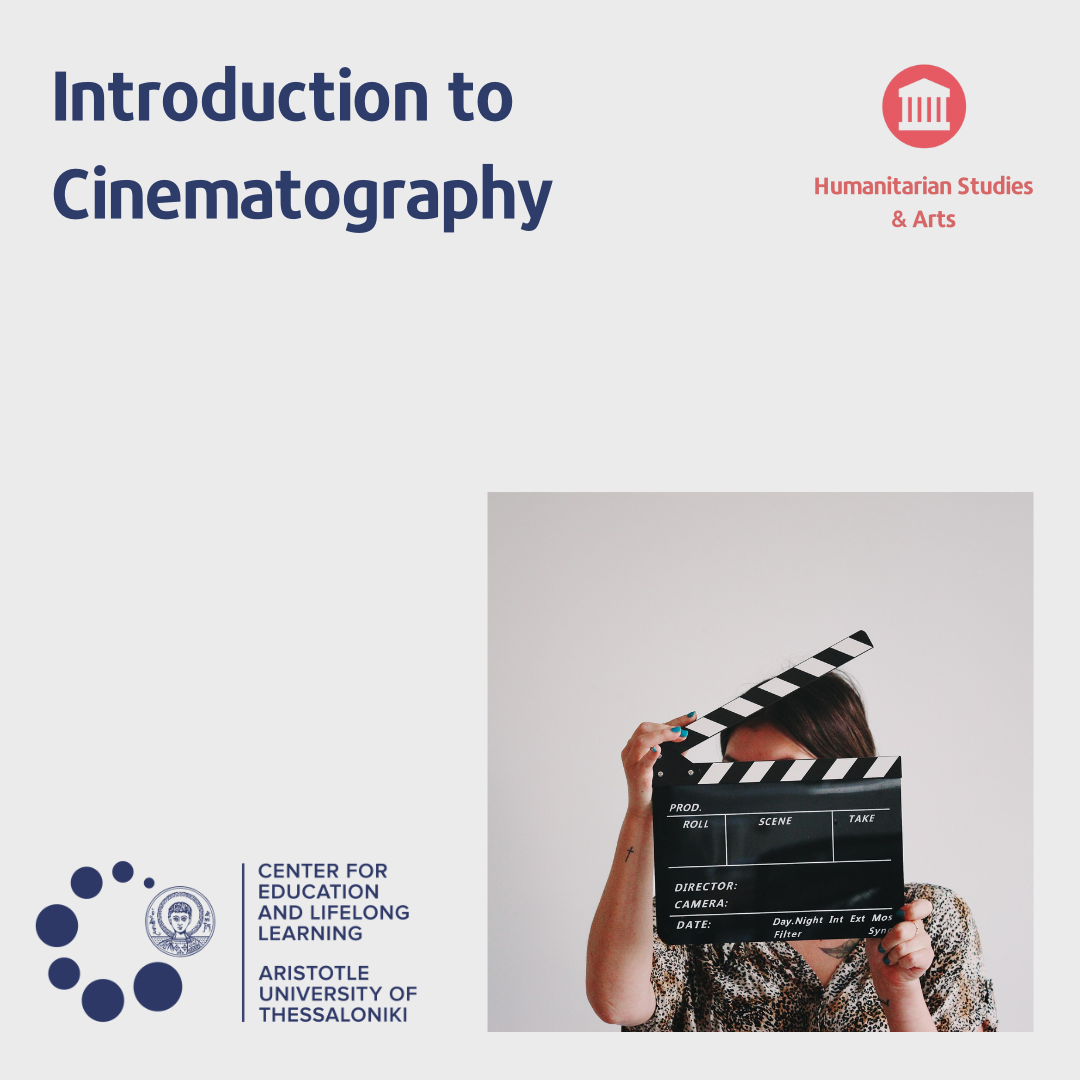2024-09-19 - 2024-12-05 ( 24 hours )
Remotely
Based on discount policy
Form Submission is completed on
Form Submission is completed on

The Center for Education and Lifelong Learning of the Aristotle University of Thessaloniki welcomes you to the Introduction to Cinematograpgy, a 24-hour course with weekly 2-hour meetings via ZOOM.
The Director of the Programme is Peter Salapatas, Professor of Cinematography at the School of Film, Fine Art School, Aristotle University of Thessaloniki, Greece.
Start Date: 19/9/2024
End of the course: 5/12/2024
Applications are submitted online from 10/4/2024 until 15/9/2024
Duration: 12 2-hour sessions
Cost: 270 euros
Discount/ECTS: Yes/2
The main objective of this online course is to approach the art of cinematography mainly from a practical perspective as well as from a theoretical one always from the perspective of visual storytelling. The objectives of the course are multifaceted. On the one hand participants will be acquainted with the art of cinematography through the use of lenses, camera movements, lighting techniques, controlling cinematic space as well as building an aesthetic approach to designing films.
Upon completion of the course, participants will understand the basic principles of cinematography, communicate more easily with the directors, understand the history of cinematography, and use it to design their films. A number of exercises/assignments will be given for each thematic unity. Assignments will be discussed during the class.
All potential participants are welcome.
Requirements:
► Internet access
► Personal email
► Access to a basic digital camera with a separate lens and a tripod.
► Basic knowledge of photography will prove to be helpful.
► Access to a number of basic lights (optional)
Selection Process
There will be an interview with all potential candidates in order to understand their past in terms of photography/cinematography and assess their needs.
The course (one complete cycle) is structured on a weekly basis with two hour ZOOM meetings every Friday from 7pm to 9pm Greece time.
Course of the Program (12 thematic unities)
All thematic unities are 2 hours each.
#1 Types of LENSES and ways they influence/support the story
#2 Cameras. Sensor, Camera positions, Monitors, Framing ASSIGMENT 1
#3 LIGHT part 1. What is light, Natural vs Artificial, Four aspects of light. Ways to control light.
#4 LIGHT part 2 Three point lighting, Lighting ratios, Measuring light, How does light support the story and bring forth the inner world of the character ASSIGMENT 2 plus an online quiz for revision purposes
#5 The shooting process Working with the director, Ways to approach a scene, Moving the camera, Master shots, Close ups.
#6 The Long Take Examples from world cinema, How does the long take support the story ASSIGMENT 3
#7 Cinematic Space part 1 Different kinds of cinematic spaces.
#8 Cinematic Space part 2 Continuation of part 1. Controlling the lines, color and rhythm of a scene. ASSIGNMENT 4 plus an online quiz for revision purposes
#9 Painting and Cinema What is the relationship between cinema and painting? ASSIGNMENT 5
#10 Image semiotics. Denotation and connotation How a photo or an audiovisual piece produces meaning and how it is related to the cultural context.
#11 Semiotics: Narration and Myth How does narration and the audio-visual choices create a myth around characters and objects. ASSIGNMENT 6
#12 Zen and the art of cinematography Ways a cinematographer can understand the shot/sequence. How to respond psychologically to the challenges of filmmaking.Ways she/he relates to the story.
Upon completion of this course the student will be awarded 2 ECTS.
The course provides participants with:
Rights of Trainees:
After successful completion of the program, participants receive a Certificate of General Training, which is issued by the Center for Education and Lifelong Learning AUTH and signed by the President of the Center.
Participants who have attended but not successfully completed the program, will be awarded a Certificate of Attendance.
For further information, please contact:
Name*: Peter Salapatas
Tel*: +30 6972442186
Email*: psalapatas@film.auth.gr
Tuition fees are 270€.
Tuition fees must be paid within the first month of the program and a deposit of 50 euros is required for the registration.
The program provides a discount policy.
Account info for the deposit:
5202-057157-381 Piraeus Bank
Code Bic (SWIFT address) PIRBGRAΑ
International Bank Account Number (IBAN): GR94 0172 2020 0052 0205 7157 381
Proof of payment should contain the following information:
– The code 75054
– The name & surname of the participant
Μπορείτε να εγγραφείτε στο Newsletter για να μαθαίνετε πρώτοι για τα νέα προγράμματα του ΚΕΔΙΒΙΜ ΑΠΘ.